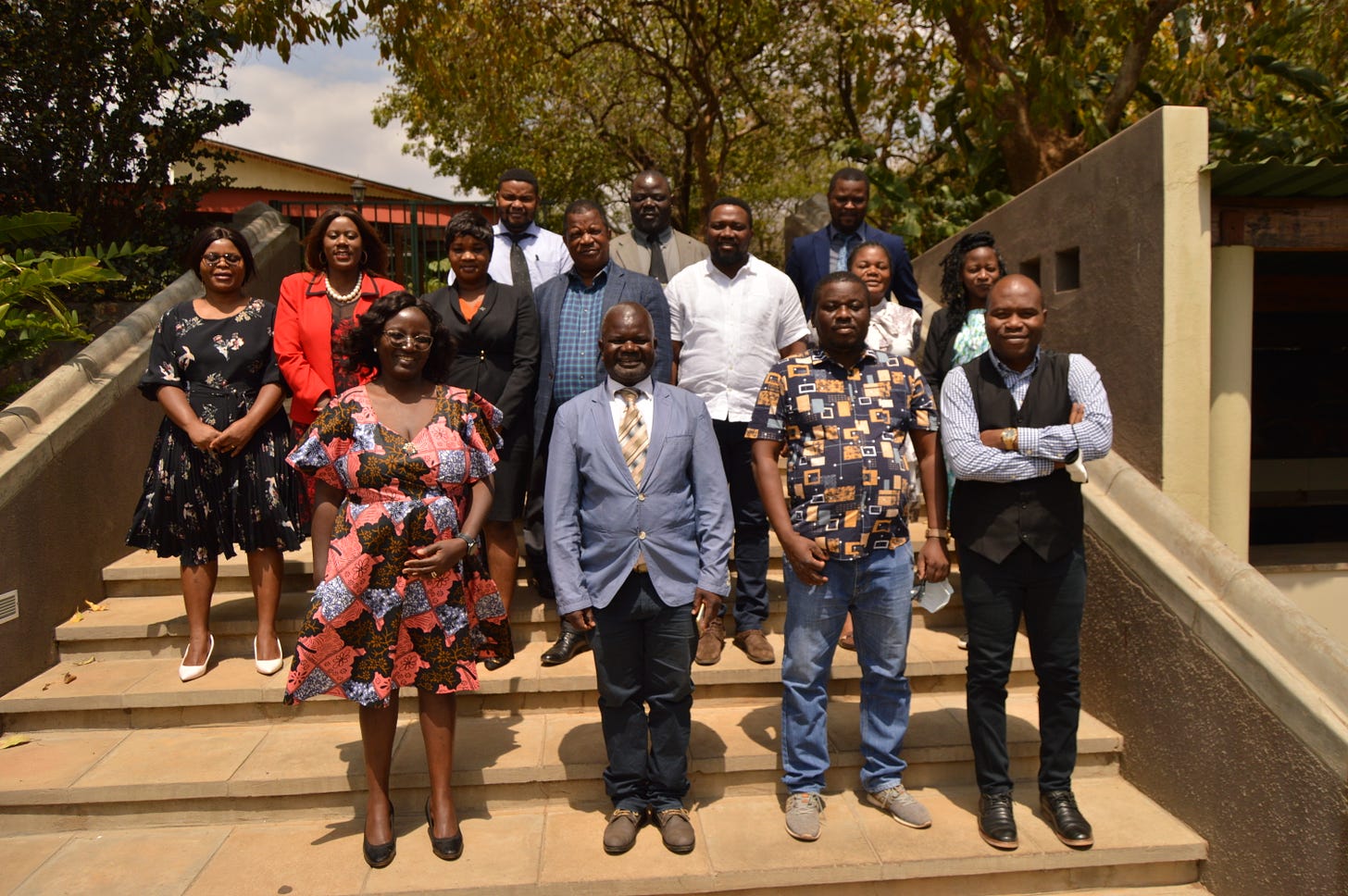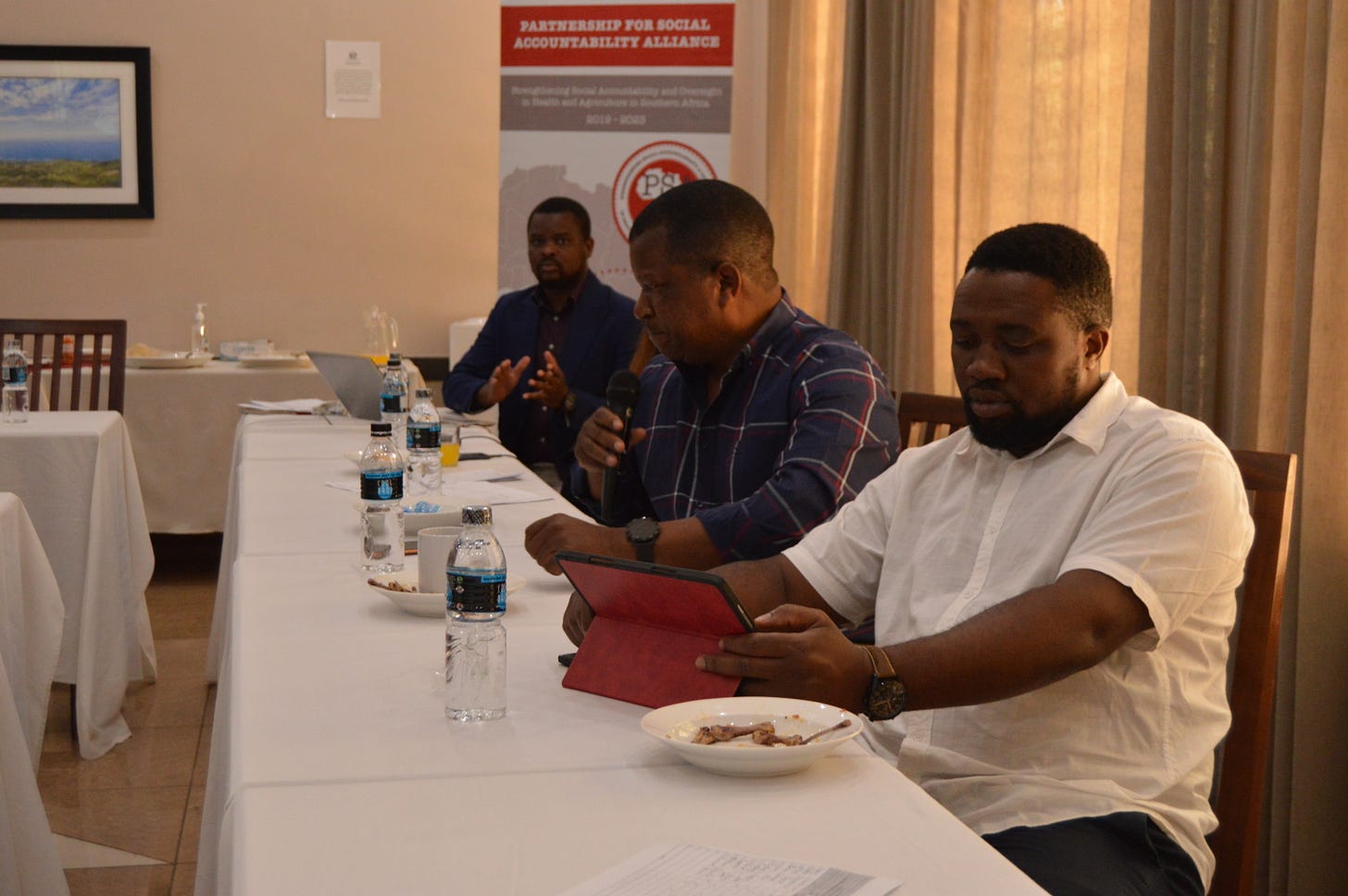Malawi has long way to go to popularize SADC RISDP 2020-2030
During the SADC #RISDP22 breakaways, the Malawi team cited lack of monitoring and lack of communication as some of the bottlenecks in popularizing RISDP 2020-2030.
Malawi: Non-state actors (NSAs) on the Southern African Development Community's (SADC) Revised Regional Strategic Development Plan (RISDP) for 2020-2030 attended a hybrid workshop on the SADC RISDP and Social Accountability in Public Resource Management on September 13-15, 2022.
Over 120 people from five of SADC's sixteen member countries participated in this dialogue from meetings in six locations (Dodoma, Lilongwe, Lusaka, Harare, Johannesburg, and Maputo) and virtually, representing various Non-State Actors (NSAs) such as civil society organizations (CSOs), smallholder farmers' associations, trade unions, youth organizations, people's movements, women's groups, faith-based organizations, media outlets, the GIZ-SNRL programme, parliamentarians.
During the breakaway sessions on September 14th, each group (country / regional) completed a template, noting (1) the agreed-upon short-term and/or long-term actions to be taken, and (2) providing 3-5 recommendations for the overall dialogue communiqué.
Among the key issues raised by the Malawi team during these breakaways were a lack of coordination among key stakeholders, such as parliamentarians, NSAs, the media, and the private sector; a lack of monitoring; a lack of communication and visibility; and a lack of accountability.
Some of the top officials from the NGO and government sectors who contributed to the issues raised by the Malawi team during the event agreed that there was still a lot of work to be done in terms of popularising (SADC) Revised Regional Strategic Development Plan (RISDP) for 2020-2030.
Deputy Director and Malawi SADC National Contact Person at the Ministry of Foreign Affairs, Mrs Faith Mwalubunju, maintains that the Malawi team raised this issue of lack of coordination among key stakeholders, e.g parliamentarians, NSAs, media, and private sector, for example, because stakeholders such as NSAs, CSOs, and others have limited information about these development projects and thus have no incentive to invest in them.
“The Regional Indicative Strategic Development Plan (RISDP) is meant to be conducted similar to how the Malawi vision 2063 is being implemented by the Malawi Government, where development and funding are sourced under the national budget. This lack of orientation occurs when stakeholders of the RISDP work independently and achieve minimal outcomes,” she says.
During the breakaway meetings, the Ministry of Foreign Affairs, among other actors, was tasked with training key stakeholders in M&E of RISDP implementation to address the lack of monitoring.
But how does the ministry see the importance of this, and how does it intend to address it?
Mrs Mwalubunju believes that training stakeholders in RISDP M&E is critical to the success of any programme or project.
She says organizations use this process to collect and analyze critical data in order to determine whether the project/project has met its goals and objectives.
“Training key stakeholders in M&E of RSDP would help organizations catch problems early, ensure resources are used efficiently and promote learning and data-driven decision making. Training programs are key to achieve this, such as short online courses,” she says.
Together with the ministry of information, the ministry of foreign affairs was also tasked with the responsibility of carrying out a number of activities including building social media visibility (Twitter, Facebook on SADC RISDP work from a local context).
In light of this, Mrs Mwalubunju thinks the Malawi team will work on the production of stories on TV, radio, newsletters, press releases, documentaries and online news stories on SADC RISD.
“Same as above, this is meant to educate the general public on the RISDP. This is an option to spread awareness of the RISDP. Having TV broadcasts and Radio broadcasts on RISDP topics,” she says.
She adds that they will also work to improve media representation in SADC committees (MISA Malawi to be included as a member).
“This is also part of spreading awareness and information about the RISDP but this is meant for the international scene. To share the progress of RISDP in Malawi with other SADC committees,” Mrs Mwalubunju says.
Chikondi Chabvuta, Regional Manager for Care, one of the leading organizations that took part in the event, says she fully supports the effort to popularize RISDP in Malawi.
According to Chabvuta, the RISDP is the guiding framework for the region into which countries feed their development plans, including those under food, nutrition, and security attainment for SADC.
“There is a need for plans developed to have budgetary support at the country and regional level to be fully realized. At the end of the day, it is about seeing the priorities at the country and regional level making the impact needed to ensure there is progress towards the realization of indicators for the countries and the region,” says Chabvuta.
Malawi, according to Chabvuta, needs to develop a clear costed plan that can be sold and financed.
“There is a need for clear responsibilities and alignment of what is proposed at the regional level finding its way in the implementation of the plans, there is a need to know how much will be needed to achieve the set goals, for example under the CAADP commitments, each country has to allocate 10% of its budget towards agriculture,” says Chabvuta.
Not only that, Chabvuta says Malawians can have a greater impact as a group, so non-state actors must work together to achieve the plans and priorities; popularize the SADC model law on public finance management and the Gender Model Law, and the need for countries to use the model law to realise their full potential and the progress that must be made in that direction.
Wales Chigwenembe, National Project Manager for PSA Project at ActionAid Malawi, who also attended the RISDP event, says that non-state actors (NSAs) (Malawi National Assembly, CSOs via CONGOMA, MEJN, and the media) are members of the Malawi SADC National Committee (SNC), which coordinates the planning, implementation, monitoring, and reporting of RISDP in Malawi, but the dialogue revealed that the aforementioned NSAs had very limited involvement throughout all processes.
As a result, he says, public social accountability monitoring is weakened, and when the NSAs plan projects and raise funds for their programmes, they do not align their strategic plans and programmes with the RISDP (MW2063) in Malawi.
“On the other hand, the NSAs that are part of the Malawi SADC sub-committees do not coordinate with fellow NSAs which limits effective participation in planning and monitoring of the implementation of RISDP processes in Malawi. If coordination among the NSAs is strengthened, accountability monitoring around RSIDP will be strengthened in Malawi,” says Chigwenembe.
He says that in order to achieve better and more sustainable results, the Malawi government must domesticate the SADC PF PFM model law as well as aggressively implement the recently approved Malawi Public Finance Management Law 2022.
All NSAs must monitor the implementation of all of these processes, he says.
Concerning calls to develop a clear costed plan that can be sold and financed, Chigwenembe says one of the major challenges for Malawi in implementing the RISDP is a limited resource envelope.
He claims that the RISDP has been completed and cost, but there is currently no clear plan for how the government will source funding for effective RISDP implementation.
According to Chigwenembe, a clear plan at both the national and district levels is required, which must be owned by all actors, including NSAs at all levels, in order to finance the strategic activities outlined in the costed plan.
He says NSAs must integrate the RISDP/MW2063 in their strategic plan to make sure that all activities implemented are linked to the RISDP/MW2063.
“The model role if domesticated will strengthen transparency, accountability and monitoring of public resources by all stakeholders for improved results (progressive human rights) across all sectors in Malawi,” he says.
Julie Middleton, Consortium Project Manager – Strengthening Social Accountability and Oversight in Health and Agriculture in Southern Africa, ActionAid International, says the dialogue provided an opportunity for civil society organizations from across SADC, particularly those in Malawi, Mozambique, Tanzania, Zambia, and Zimbabwe, to learn more about the SADC RISDP and its impact on development in their respective countries.
Said Middleton: “As there isn’t a lot of publicly available or accessible information on SADC processes, and not much media coverage, a lot of what happens at SADC remains unknown or misunderstood by civil society and the public generally. It is our hope that civil society now is more aware of how to input into SADC planning and reporting at the national level, and that governments will also make more substantive efforts to involve civil society. It is only through strengthening social accountability that SADC programmes will really benefit the people of the region.”
But then, how will PSA Alliance support and finance the Malawi action plan?
According to Middleton, the Swiss Agency for Development and Cooperation (SDC) funding for the PSA Alliance project in Malawi (as well as Mozambique and Tanzania) will expire in June 2023, but they are working with partner organisations to identify possible new sources of funding.
“Additionally, as this dialogue was co-convened with many other organisations, many of the activities mentioned in the action plan align with existing advocacy agendas of the organisations involved, so it is hoped that they will be able to advance these plans alongside their ongoing work, even in the absence of direct funding from PSA Alliance,” she said.
Middleton says because the PSA Alliance project will continue at the regional level for at least until December 2024, Malawi partners will be invited to share their work and progress on regional platforms as well.
Middleton expressed his appreciation for the involvement of the SADC Secretariat and the SADC Parliamentary Forum in the Regional Indicative Strategic Development Plan (RISDP) dialogue in general. Both institutions, as well as their national representatives - SADC National Contact Points and Members of Parliaments - are emphasizing the importance of civil society participation in regional processes.
She said: “Many of the discussions in the RISDP NSA dialogue reiterated this – and urged the national government to ensure there are spaces for civil society to input into planning, monitoring and reporting of the RISDP at the national level. This involves facilitating public access to plans and reports, as well as supporting the establishment of inclusive, multi-stakeholder SADC National Committees where they don’t currently exist (ie. Zimbabwe, Tanzania, etc) and strengthening them where they do (ie. Malawi, Mozambique, Zambia).
“We are also monitoring the operationalization of the recently approved SADC Regional Mechanism for NSA Engagement, and we hope this will be up and running soon to formalize the involvement of civil society at the regional level.”





